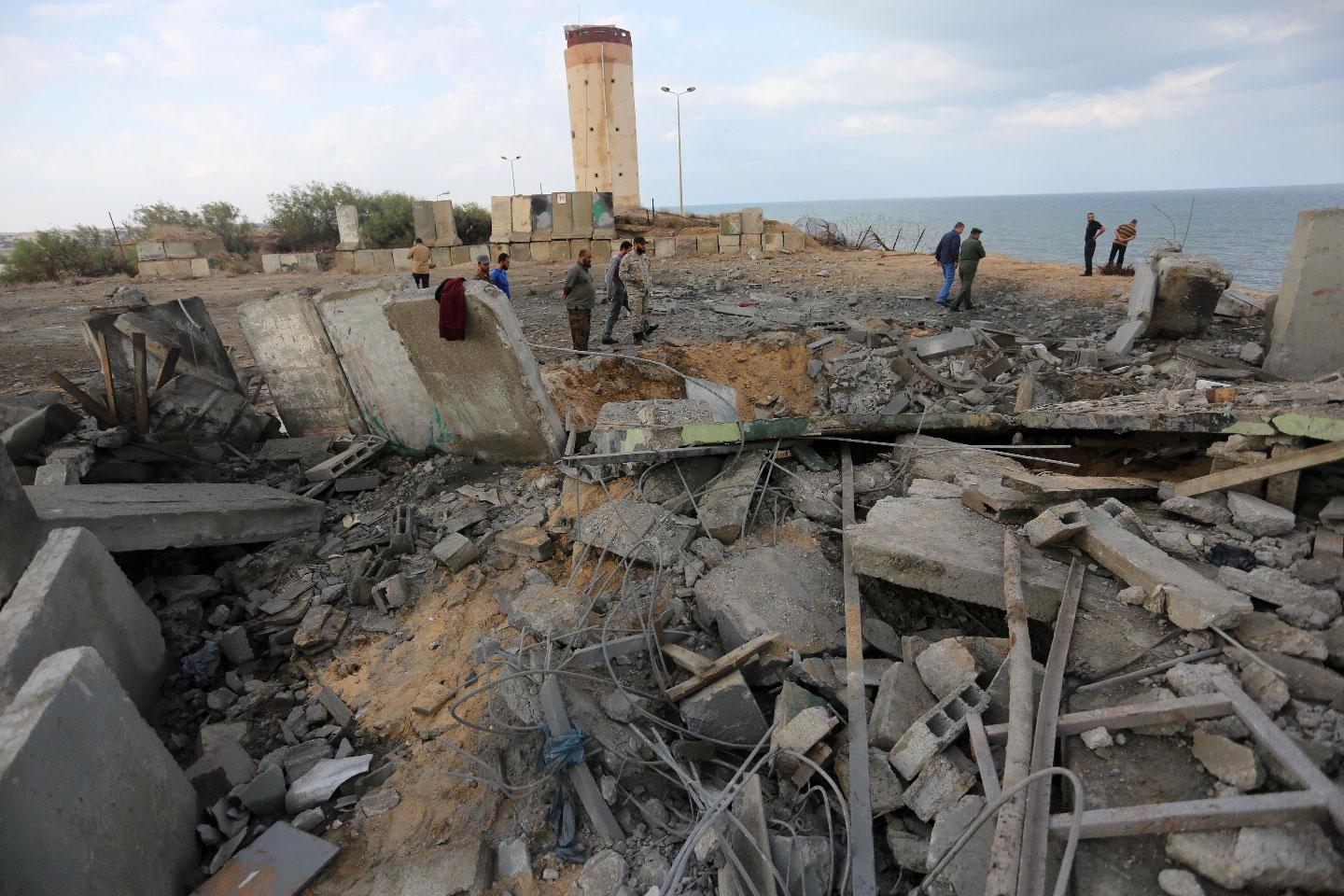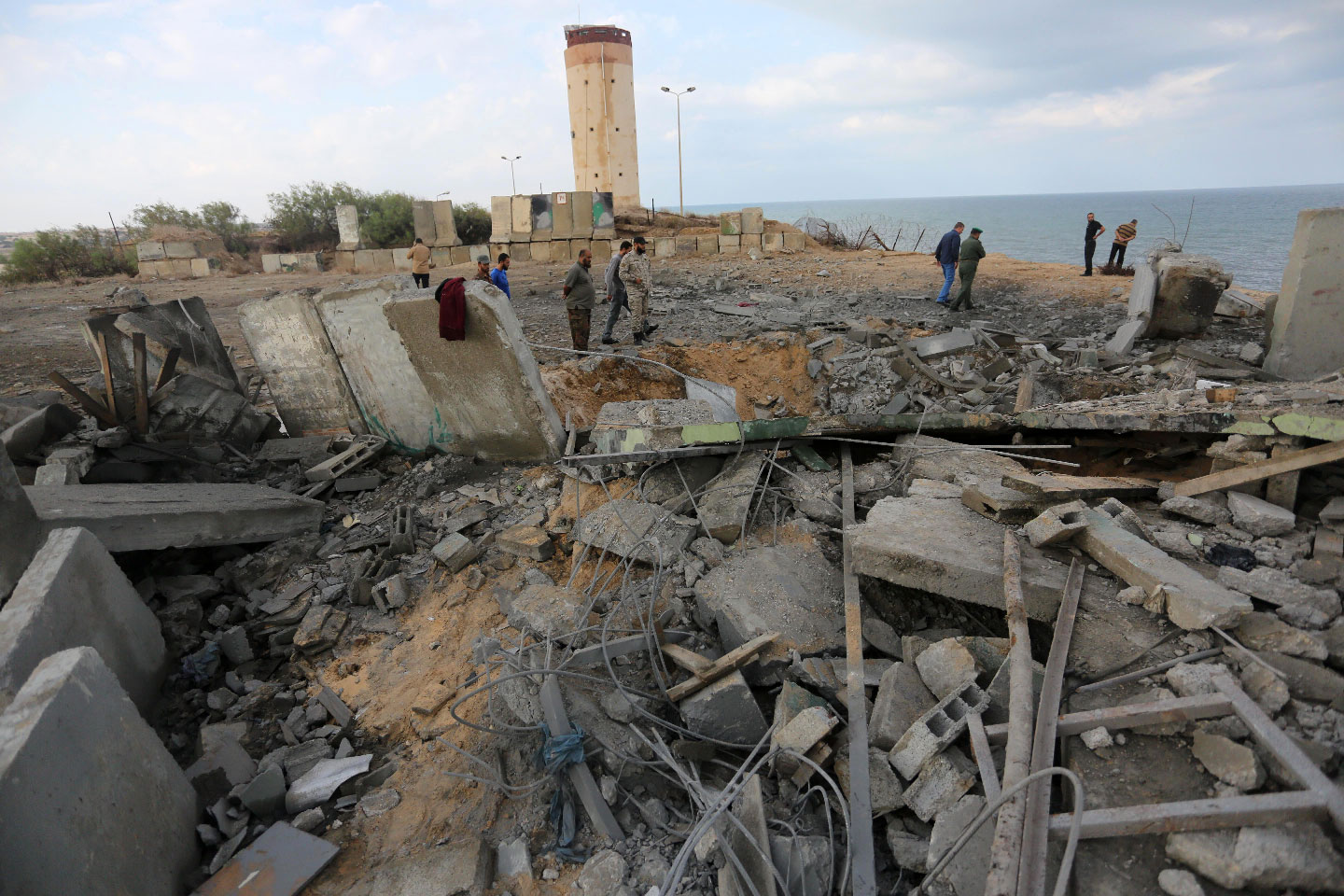Hamas to probe rocket fire as Israel deploys forces
GAZA CITY - Israel ramped up its armoured forces along the Gaza border on Thursday in a daylight show of force, a day after a Palestinian rocket destroyed a home in southern Israel.
With the deployment clearly visible from main Israeli roads near the Gaza Strip, senior Egyptian security officials met leaders of the enclave's ruling Hamas to try to calm tensions.
Hamas and the smaller Islamic Jihad militant group quickly denied firing the rockets.
Much may depend on the scope and intensity of a planned Palestinian protest at the border with Israel on Friday, where demonstrations have been held over the past six months.
Israeli Prime Minister Benjamin Netanyahu, who convened his security cabinet on Wednesday after the rocket wrecked a home in the city of Beersheba, pledged to take "very strong action" if Palestinian protests continued.
Israeli leaders have said they will not tolerate rocket attacks or attempts, during the border protests, to breach Israel's frontier fence with the Palestinian territory of two million people.
A Reuters photographer counted some 60 tanks and armoured personnel carriers at a deployment area near the border, calling it the largest number he has seen there since the 2014 war between Israel and Hamas.
Narrow escape
Hamas on Thursday pledged to launch an investigation into the rocket fire at Israel the previous day, in an apparent bid to calm fears of a new war.
Israeli children returned to schools near the border that had been closed on Wednesday after the pre-dawn rocket fire from Gaza badly damaged a family home in the southern city of Beersheba.
But the risk of a new war, whether through miscalculation or design, remained.
Three children had a narrow escape after their mother moved them into the safe room, as much of the rest of the house was destroyed, the army said.
Hamas, which has ruled Gaza for a decade, issued a joint statement with its ally Islamic Jihad publicly disavowing the rocket fire.
But Israel rejected their denial, saying they were the only groups armed with rockets of a range sufficient to reach Beersheba -- 40 kilometres away -- and the sea off Tel Aviv -- 70 kilometres.
Israel in any case holds Hamas responsible, as Gaza's de factor ruler, for all fire from the territory regardless of who launches it.
"There are security service investigations in Gaza to uncover who is behind the rocket fire and there will be harsh measures against those (found guilty)," senior Hamas official Bassem Naim said.
He said the rocket fire "aimed to sabotage Egyptian efforts" to broker a long-term truce between Hamas and Israel, which have fought three wars since 2008.
A video published by Hamas's military wing on Thursday showed militants preparing rockets for launch, with the caption: "Read us correctly, a mistake would not benefit," written in Hebrew.
Beersheba mum 'averted war'
Near daily protests along the border since March 30 against Israel's crippling 11-year blockade of the impoverished enclave have sparked repeated clashes with the army.
More than 200 Palestinians including children, medics and journalists have been killed by Israeli fire, while one Israeli soldier has been shot dead in that time.
Wednesday's rocket fire triggered Israeli air strikes that killed one suspected militant and raised fears of a new escalation.
Israeli Prime Minister Benjamin Netanyahu chaired a meeting of the security cabinet lasting several hours on Wednesday evening.
But no statement was released afterwards and Israeli media reported that ministers had failed to agree on how to respond to the rocket fire and the persistent protests.
The mass circulation Yediot Aharonot newspaper said the swift action of the mother in Beersheba to protect her family had probably prevented a new war.
"If the rocket attack had resulted in casualties, the political echelon's manoeuvring room would have been reduced to zero, and Israel would have launched, just like it did four years ago, a military operation that it neither wants nor which it believes will be effective."
Hamas seized control of Gaza from loyalists of Palestinian president Mahmud Abbas in a near civil war in 2007 and the split has made peace negotiations with Israel harder.
Egypt and the UN have been seeking to broker an agreement that would see Israel relax its blockade of Gaza in exchange for a prolonged period of calm from Hamas.
Abbas's Fatah movement opposes any such deal, saying it amounts to a recognition of Islamist control in Gaza.
Egyptian Intelligence Minister Abbas Kamel had been expected in Gaza on Thursday for his first visit since taking up the post in January, fuelling talk of a deal.
Hamas official Naim said the minister was forced to postpone because of a timetabling problem.
But an Egyptian delegation led by senior intelligence official Ayman Badea did travel to Gaza and met with Hamas leader Ismail Haniya.
An Egyptian official said they were still hopeful of achieving a long-term deal to restore calm.
Delicate situation
A Palestinian official said the Egyptian delegation was also in contact with Israeli leaders to curb the current tensions.
"The situation is delicate. No one wants a war," he said.
"Palestinian factions are demanding an end to the Israeli blockade that strangled life and business in Gaza," the official said.
Palestinians have been protesting along the border since March 30, demanding an end to Israel's blockade of Gaza and the right to return to lands that Palestinians were displaced from, by Jewish immigrants from Europe, upon Israel's founding in 1948.
About 200 Gazans have been killed by Israeli troops since the border protests began, according to Palestinian Health Ministry figures. Palestinians have launched incendiary balloons and kites into Israel and on occasion breached an Israeli frontier fence.
More than 2 million Palestinians are packed into the coastal enclave. Israel withdrew its troops and settlers from Gaza in 2005 but maintains tight control of its land and sea borders. Egypt also restricts movement in and out of Gaza on its border.
In addition to sporadic incidents, Israel and Hamas have fought three wars in the past 10 years. The internationally-mediated peace process aimed at finding a two-state solution to the Israeli-Palestinian conflict is all but moribund.
Egypt is one of only two Arab states to have official relations with Israel and plays a key role in indirect negotiations between the Jewish state and Hamas.
Mukhaimer Abu Saada, a political analyst in Gaza, said those who fired the rockets wanted to prevent the Egyptian minister's visit and "stop reconciliation and a truce."
Fringe Islamist groups opposed to Hamas have previously fired rockets. Suspicion could also fall on factions within Hamas and Islamic Jihad opposed to a truce deal.



